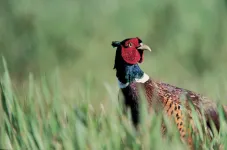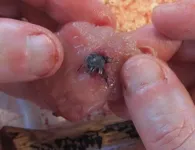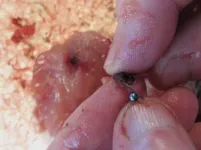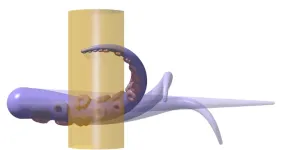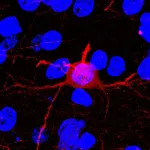(Press-News.org) Three years into a five-year pledge to completely phase out lead shot in UK game hunting, a Cambridge study finds that 94% of pheasants on sale for human consumption were killed using lead.
The pledge, made in 2020 by nine major UK game shooting and rural organisations, aims to protect the natural environment and ensure a safer supply of game meat for consumers. Lead is toxic even in very small concentrations, and discarded shot from hunting poisons and kills tens of thousands of the UK’s wild birds each year.
A Cambridge-led team of 17 volunteers bought whole pheasants from butchers, game dealers and supermarkets across the UK in 2022-23. They dissected the birds at home and recovered embedded shotgun pellets from 235 of the 356 pheasant carcasses.
The main metal present in each shotgun pellet was revealed through laboratory analysis - conducted at the Environmental Research Institute, University of the Highlands and Islands, UK. Lead was the main element in 94% of the recovered shot pellets; the remaining 6% were predominantly composed of steel or a metal called bismuth.
The results are published today in the Conservation Evidence Journal.
At the request of the Defra Secretary of State, the UK Health & Safety Executive assessed the risks to the environment and human health posed by lead in shots and bullets. Their report proposes that the use of lead ammunition be banned, and this is currently under review. While remaining committed to phasing out lead shot voluntarily, many shooting organisations do not support the proposed regulatory restrictions.
“If UK game hunters are going to phase out lead shot voluntarily, they’re not doing very well so far,” said Professor Rhys Green in the University of Cambridge’s Department of Zoology, first author of the study.
He added: “The small decrease in the proportion of birds shot with lead in the latest UK shooting season is nowhere near on track to achieve a complete transition to non-toxic ammunition in the next two years.”
This is the third consecutive year the team has conducted the analysis. Their latest study shows a small improvement on the 2021/22 and 2021/20 shooting seasons, when over 99% of the pheasants studied were shot using lead ammunition.
In separate initiatives, some suppliers of game meat for human consumption - including Waitrose & Partners - have voluntarily announced their intention to stop selling game killed using lead shot. An assurance scheme has also been launched to encourage suppliers and retailers to facilitate the transition.
The team did not find any pheasant on sale in Waitrose in 2022/23 despite repeated visits to 15 different stores. Waitrose staff reported that the company had not been sufficiently assured by any supplier in 2022/23 that all pheasants had been killed using non-lead ammunition.
“Waitrose is the only retailer we know of fully complying with the pledge not to supply pheasant killed using lead, but it’s only managing this by not selling any pheasant at all,” said Green.
Steel shotgun pellets are a practical alternative to lead, and the vast majority of shotguns can use them or other safe lead-free alternatives. Shooting magazines and UK shooting organisations have communicated positive messages for three years about the effectiveness and practicality of non-lead shotgun ammunition.
Shooting and rural organisations - including the British Association for Shooting and Conservation and the Game and Wildlife Conservation Trust - have consistently provided information and detailed guidance to encourage the transition from lead to non-lead ammunition since 2020.
“Denmark banned lead shotgun ammunition in 1996, and a successful transition was made to steel and bismuth. It’s safer for the environment and gives game shooting a better image,” said Green.
A previous study led by Green found that pheasants killed by lead shot contain many fragments of lead too small to detect by eye or touch, and too distant from the shot to be removed without throwing away a large proportion of otherwise useable meat. This means that eating pheasant killed using lead shot is likely to expose consumers to raised levels of lead in their diet, even if the meat is carefully prepared to remove whole shotgun pellets and the most damaged tissue.
Lead has been banned from use in paint and petrol for decades. It is toxic to humans when absorbed by the body and there is no known safe level of exposure. Lead accumulates in the body over time and can cause long-term harm, including increased risk of cardiovascular disease and kidney disease in adults. Lead is known to lower IQ in young children, and affect the neurological development of unborn babies.
END
Voluntary UK initiatives to phase out toxic lead shot for pheasant hunting have had little impact
2023-02-27
ELSE PRESS RELEASES FROM THIS DATE:
Genes & Cancer | Severe herpesvirus infection beats adult T-cell leukemia/lymphoma
2023-02-25
“Although contracting herpes simplex or herpes zoster is unpleasant, the mechanism by which these herpesvirus infections can produce a therapeutic effect […]”
BUFFALO, NY- February 24, 2023 – A new editorial was published in Genes & Cancer on January 19, 2023, entitled, “Severe herpesvirus infection beats adult T-cell leukemia/lymphoma.”
In this recently published editorial, researcher Tatsuro Jo from the Japanese Red Cross Nagasaki Genbaku Hospital’s Department of Hematology discussed aggressive type adult T-cell ...
Reaching like an octopus: A biology-inspired model opens the door to soft robot control
2023-02-25
Octopus arms coordinate nearly infinite degrees of freedom to perform complex movements such as reaching, grasping, fetching, crawling, and swimming. How these animals achieve such a wide range of activities remains a source of mystery, amazement, and inspiration. Part of the challenge comes from the intricate organization and biomechanics of the internal muscles.
This problem was tackled in a multidisciplinary project led by Prashant Mehta and Mattia Gazzola, professors of mechanical science & engineering at the University of Illinois ...
Notable inaccuracies found in insurers’ mental health care provider directories in California
2023-02-25
As the mental health crisis continues across the nation, many people struggle to find the care they need. Health insurers publish directories of mental health providers to help consumers obtain care; however, inaccurate directories and a shortage of providers within many insurance networks can make finding covered mental health services challenging.
The U.S. federal government and those of many states have put regulations in place to ensure provider directory accuracy, with California having some of the most stringent rules. However, research on the accuracy of mental health care provider directories has been limited. Simon Haeder, PhD, associate ...
Workers moving products in the U.S. food supply chain at high risk of injury
2023-02-25
UNIVERSITY PARK, Pa. — Workers tasked with moving products in the immense U.S. food system are at a high risk of serious injury, according to a new Penn State-led study, and pandemic-caused, supply-chain problems have worsened the situation, researchers suggest.
The modern food supply chain presents unique hazards to employees that result in higher rates of death and injury when compared to most other industries, noted lead researcher Judd Michael, Penn State professor of agricultural and biological engineering. ...
First-of-its-kind study examines the impact of cannabis use on surgical patients' post-procedure healthcare needs
2023-02-25
BOSTON – As legislation in multiple states eases former restrictions around medical and recreational cannabis in the United States, an increasing proportion of the population reports use of the drug. Between 2016 and 2018, more than 22 percent of Massachusetts residents reported any prior cannabis use for medical or recreational reasons. However, little is known about cannabis use in patients who undergo surgery or interventional procedures, where cannabis use has important additional clinical implications.
In a new study published in The Lancet’s eClinical Medicine, researchers led ...
New method creates material that could create the next generation of solar cells
2023-02-25
UNIVERSITY PARK, Pa. — Perovskites, a family of materials with unique electric properties, show promise for use in a variety fields, including next-generation solar cells. A Penn State-led team of scientists created a new process to fabricate large perovskite devices that is more cost- and time-effective than previously possible and that they said may accelerate future materials discovery.
“This method we developed allows us to easily create very large bulk samples within several minutes, rather than days or weeks using traditional methods,” said Luyao Zheng, a postdoctoral researcher in the Department of Materials Science at Penn State and lead author on the ...
PETA scientists’ roadmap to animal-free research gets COVID-era update
2023-02-25
Washington — PETA scientists have just released a new edition of the groundbreaking Research Modernization Deal (RMD), the world’s first comprehensive plan for phasing out the use of animals in experimentation. The update is packed with new, cutting-edge information and reflects the latest scientific developments and regulatory changes since the RMD was first introduced in 2018.
The RMD provides detailed information about the pressing need to transition toward human-relevant research, and this new edition outlines non-animal methods for studying COVID-19. It also ...
Excess weight, obesity more deadly than previously believed
2023-02-25
Excess weight or obesity boosts risk of death by anywhere from 22% to 91%—significantly more than previously believed—while the mortality risk of being slightly underweight has likely been overestimated, according to new CU Boulder research.
The findings, published Feb. 9 in the journal Population Studies, counter prevailing wisdom that excess weight boosts mortality risk only in extreme cases.
The statistical analysis of nearly 18,000 people also shines a light on the pitfalls of using ...
Clues about the northeast’s past and future climate from plant fossils
2023-02-25
Ancient climates can help us understand the past, but also the future. 23 million years ago, in a time called the Miocene Epoch, Connecticut was around five to six degrees warmer than today and located roughly where Long Island is now. By the end of the Miocene, around five million years ago the earth had gradually cooled, Antarctica was glaciated, and there was some Arctic ice as well.
This cooling scenario moved in the opposite direction of today’s changing climate. One difference UConn Department of Earth Sciences Assistant Professor in Residence Tammo Reichgelt points out is that in the past, these changes happened gradually, spaced ...
A new epigenetic brain defense against recurrence of opioid use
2023-02-25
Substance use disorder (SUD) is an extremely difficult disorder to overcome, and many individuals with SUD return to regular use after repeated attempts to quit.
A return to regular drug use can be caused by the body’s physical dependence on the drug as well as experiences associated with prior drug use. Exactly how these drug associations are formed in the brain and how they trigger a return to drug use remain unclear.
“Individuals make long-lasting associations between the euphoric experience of the drug and the people, places and things associated with drug use,” said Christopher Cowan, Ph.D. professor in the Department ...
